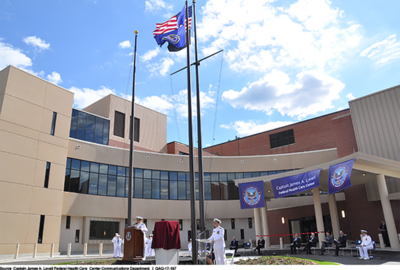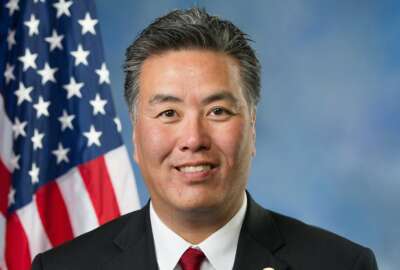Lawmakers urge cancellation of multibillion dollar VA logistics system
Congressional leaders urged VA to abandon a costly supply chain IT system it recently decided to borrow from the Defense Health Agency that has failed to meet VA's...
The Department of Veterans Affairs’ congressional overseers are asking Secretary Dennis McDonough to put a stop to the VA’s implementation of a multibillion dollar medical supply chain management system that, at least so far, has fallen woefully short of its medical staff’s needs.
VA decided to adopt the Defense Health Agency’s Defense Medical Logistics Standard Support (DMLSS) system in 2019, and plans to spend $2.2 billion to deploy it throughout the Veterans Health Administration over the next 15 years, despite the fact that the DHA system is already 20 years old.
According to the department’s inspector general, the system failed to meet 44% of staff’s requirements at the first hospital where it was deployed, the joint VA-DoD James A. Lovell Federal Health Care Center near Chicago.
In a Jan. 31 letter signed by the chairmen and ranking members of the House and Senate Veterans Affairs Committees and their counterparts from two House subcommittees, lawmakers said the system hasn’t helped VA live up to its promises of improving supply chain management. Instead, they said, reports of its shortcomings are continuing to mount.
“The evidence now indicates DMLSS is incapable of meeting the majority of VA’s supply chain management requirements,” they wrote. “Further, there are serious cost considerations. VA’s preliminary market assessment from 2018 indicated that DMLSS would be more expensive than other, potentially more capable systems, and VA never completed an independent life cycle cost estimate for the DMLSS implementation.”
The same letter reveals that a recent internal program assessment, conducted by the department’s chief acquisition officer, chief information officer, chief financial officer and general counsel, has also recommended DMLSS’s cancellation. VA provided the assessment to the committees in response to an oversight request.
VA officials declined to answer specific questions from Federal News Network about the status of its supply chain management program and whether the department has made a decision to cancel DMLSS. In an emailed statement, a spokesman said only that the department received the Jan. 31 letter and “will respond appropriately.”
Kurt DelBene, the assistant secretary of Veterans Affairs for information technology was scheduled to testify Wednesday before the House Veterans Affairs Committee on VA IT infrastructure issues. The advance written testimony he supplied to the committee made no specific mention of DMLSS, but said VA’s chief acquisition officer, Mike Parrish, is still conducting an enterprise-wide assessment to develop a broader supply chain management strategy for the department.
According to VA’s inspector general and the Government Accountability Office, that sort of strategy has been severely lacking. According to their audits and investigations, it’s one major reason VA spent $176 million on DMLSS before answering key questions like whether the system could be effectively scaled to the entire Veterans Health Administration, and whether it would adequately meet VA’s requirements.
“More money will not solve VA’s woes. Unless VA breaks its habit of putting action ahead of strategy, VA, Congress and veterans will not see the outcomes they want and expect from billions of dollars in investments,” Shelby Oakley, a GAO director for contracting and national security acquisitions told the House Veterans Affairs Committee during a November hearing. “VA faces a number of fundamental and cultural challenges that need to be addressed before it can make real progress in improving. For example, in an ongoing review, our preliminary observations indicate that many of VA’s major programs are not following its current enterprise-wide acquisition framework.”
As to DMLSS specifically, the OIG found the department committed itself to spending hundreds of millions of dollars on the project without doing much to ensure internal program controls or oversight. The VA Logistics Redesign (VALOR) program office, which oversees the DMLSS implementation, has had six separate program managers over the past two years, according to the inspector general.
And VA didn’t fund or staff that office until after it had already decided to implement the project at the Lovell health center, Leigh Ann Searight, a deputy assistant VA inspector general told the committee during the November hearing.
“Before this, VA entrusted DMLSS system implementation to a limited number of temporary staff borrowed from other offices, some of whom had a limited understanding of their roles and responsibilities, did not believe they had oversight responsibilities, and did not always guide Lovell staff,” she said. “VA also initially created an organizational structure involving multiple offices with no decision-making authority, a move that delayed early efforts.”
In a related issue that further complicates the VA logistics puzzle, the department still needs to decide what it’s going to do about the main contract vehicle it uses to procure medical supplies. VA decided in late 2020 to start using the Defense Logistics Agency’s Medical-Surgical Prime Vendor (MSPV) contract at the exact same time it had just made a new round of awards for its own MSPV vehicle, called MSPV 2.0.
The winners of VA’s contract successfully sued the department in the Court of Federal Claims. In a July 2021 decision, the court prohibited VA from moving its requirements to the DLA contract. Judge David Tapp found that the path the department wanted to pursue would have led to a giant windfall for DLA contract holders, essentially doubling the value of the existing ID/IQ contract, with the vendors who bid on VA’s MSPV contract “holding the bag.”
“If there can be a literary analogy to this government procurement, it would be Longfellow’s ‘The Wreck of the Hesperus’ which chronicles a prideful sea captain’s avoidable downfall on the rocks of Norman’s Woe.” Judge Tapp wrote. “Like the experienced crew of the Hesperus, agency personnel warned of the perils of a plotted course.”
The new letter from congressional leaders urges to the department to start a brand new selection process to eventually pick a medical logistics system that would deliver better results than DMLSS, but that it consult with Congress before it makes a decision.
“We would also like to reiterate the committees’ requests made in 2018, 2019, and 2020 that VA present us with the available supply chain modernization alternatives, each indicating cost, schedule, dependencies, and any other considerations before beginning to implement another system,” lawmakers wrote. “This is the information we need to discharge our responsibility as authorizing committees to authorize major acquisitions. To be successful, VA must conduct robust acquisition planning and market research and articulate clearly defined requirements before selecting a solution.”
In a January letter to Parrish, the VA acquisition chief, the Coalition for Government Procurement also urged the department to start a new source selection process for its own the MSPV 2.0 procurement. One major advantage of that approach, the industry group said, is that VA could leverage the blanket purchase agreements it already has in place for medical supplies.
“The VHA currently has BPAs with 121 different suppliers covering over 70,000 products. The term of these BPAs is five years. VHA has also established a team dedicated to managing the BPAs,” wrote Roger Waldron, the coalition’s president. “Quickly moving to a new, competitively-award set of Prime Vendor contracts will ensure the VA has access to tens of thousands of products at fair and reasonable prices. It will also support the long-term health of the medical supply chain for the VA and its industry partners.”
Waldron also urged the department to create a new dashboard to help VA — and outsiders — monitor progress on its overall supply chain strategy development effort.
“A dashboard will serve as a key management tool for the VA while providing stakeholders with timely information and updates on the VA’s efforts,” he wrote.
Copyright © 2025 Federal News Network. All rights reserved. This website is not intended for users located within the European Economic Area.
Jared Serbu is deputy editor of Federal News Network and reports on the Defense Department’s contracting, legislative, workforce and IT issues.
Follow @jserbuWFED






